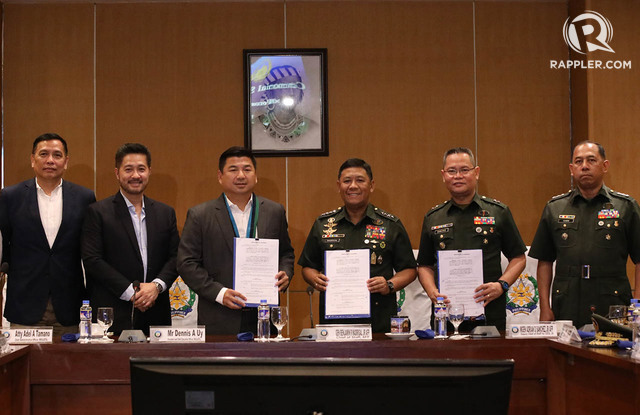A senator and a security expert say the deal exposes the Philippine military to Chinese spying at a time when other countries are shunning Chinese technology companies

DENNIS UY AND THE TOP BRASS. Military chief Gen. Benjamin Madrigal Jr. (3rd-right), Mislatel president and CEO Dennis Uy (3rd-left), Maj. Gen. Adrian Sanchez (2nd-right) and Mislatel chief administrative officer Adel Tamayo (2nd-right) lead the signing on Wednesday, Sept. 11, 2019. Photo by Darren Langit/Rappler
MANILA, Philippines – Opposition Senator Francis “Kiko” Pangilinan slammed the deal entered into by the Armed Forces of the Philippines (AFP) with the Mislatel consortium allowing the Chinese-backed telco to set up equipment and infrastructure in military camps and installations.
“Why build these telco towers inside camps in the first place?”
Mislatel, which will roll out services in 2020 under the brand Dito Telecommunity, is funded by the Beijing-run China Telecom in the consortium.
“The Philippine government has not only allowed the Chinese telco on our soil, it has laid the red carpet for Dito Telecoms inside our military camps,” Pangilinan said in a statement on Thursday, September 12, a day after the AFP and Mislatel signed their agreement.
The Liberal Party president pointed out that companies controlled by the Chinese government are mandated to gather and provide intelligence – or to spy – for China.
Chapter 1, Article 7 of China’s National Intelligence Law states, "Any organization or citizen shall support, assist, and cooperate with the state intelligence work in accordance with the law..."
Pangilinan said the deal "raises fears of electronic espionage and interference given the record of some Chinese firms for engaging in this illegal activity."
"Our security and foreign policies have become so absurd,” he added.
Siphoning information
Security and defense analyst Jose Antonio Custodio told Rappler that worries about China using Mislatel’s facilities to “siphon information” are valid.
“Beijing itself will be tanga (stupid) if they don’t take advantage of the arrangement,” Custodio said, adding that the security risk is obvious.
While many countries including the US are holding off on Chinese communication providers and technologies over security concerns, “here we are opening ourselves up, and in military camps of all places,” the former National Security Council consultant pointed out.
Australia, Canada, Japan, New Zealand, Taiwan, the UK, and the US are among countries that have either banned or restricted the use of the Chinese company Huawei’s technology in their fifth generation or 5G networks to guard against Chinese spying.
The military has acknowledged the “vulnerability” that goes with the deal with Mislatel, but AFP chief of staff Benjamin Madrigal Jr said their intelligence units have ways of preventing espionage.
Besides, Madrigal said the other telcos Globe and Smart have similar arrangements with the AFP. They are, however, Filipino-owned private companies.
China, which controls China Telecom, disputes the Philippines’ sovereignty and sovereign rights in the West Philippine Sea, as it vies for an oil and gas exploration deal with the Duterte administration to split the resources from the Philippines’ western exclusive economic zone.
Unreliable ally
With the maritime dispute, violent extremism, and the communist insurgency on their plate, the AFP would spread itself even thinner by having to mind a cybersecurity threat within their own camps, Custodio said.
“From the Chinese perspective, they may perceive what happened as a gauge of their success in coopting elements from within the Philippine military,” he added.
Chinese presence in Philippine military bases would also make other countries wary of dealing with the AFP, especially the US, a treaty ally with rotational presence in several camps.
“We will come out as an unreliable ally,” said Custodio.
Both Pangilinan and Custodio pointed out that even Defense Secretary Delfin Lorenzana flagged the security threat from Chinese-dominated Philippine Online Gambling Operation (POGO) hubs near military bases.
"Paano pa itong nasa loob na mismo ng mga kampo?” Pangilinan asked. (What more this one that's inside the camps themselves?)
The deal between the AFP and Mislatel has yet to get Lorenzana’s formal approval.
Rappler sought comment from Lorenzana, who's abroad, but he has not responded.
https://www.rappler.com/nation/239994-china-backed-telco-access-afp-camps-questioned

No comments:
Post a Comment
Note: Only a member of this blog may post a comment.